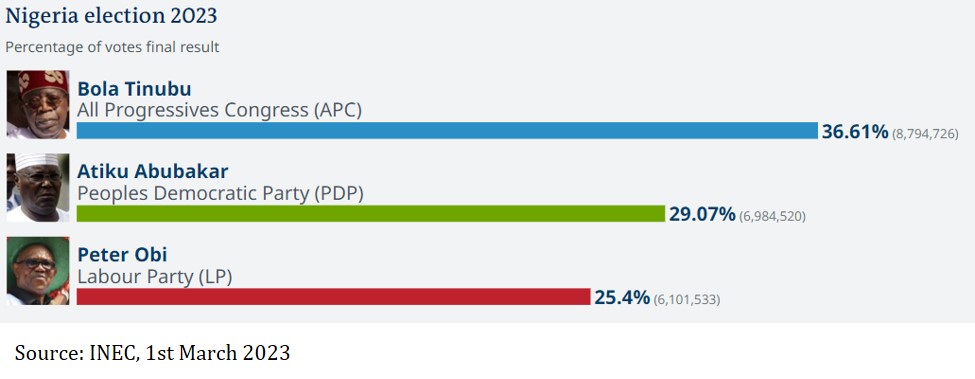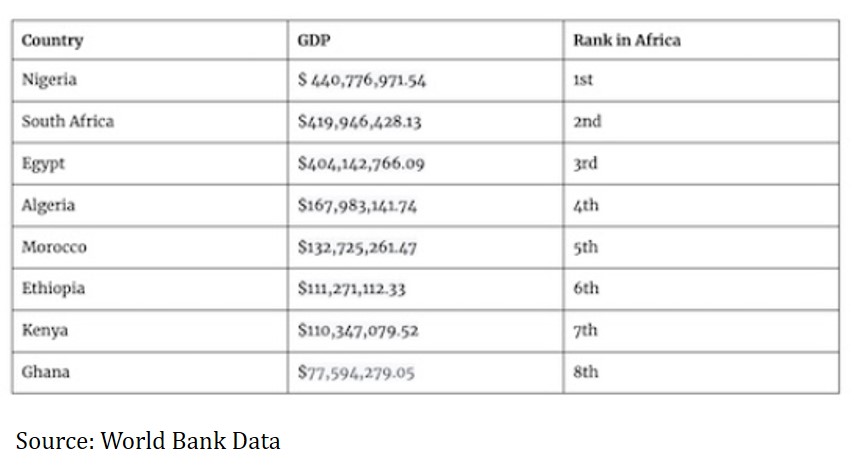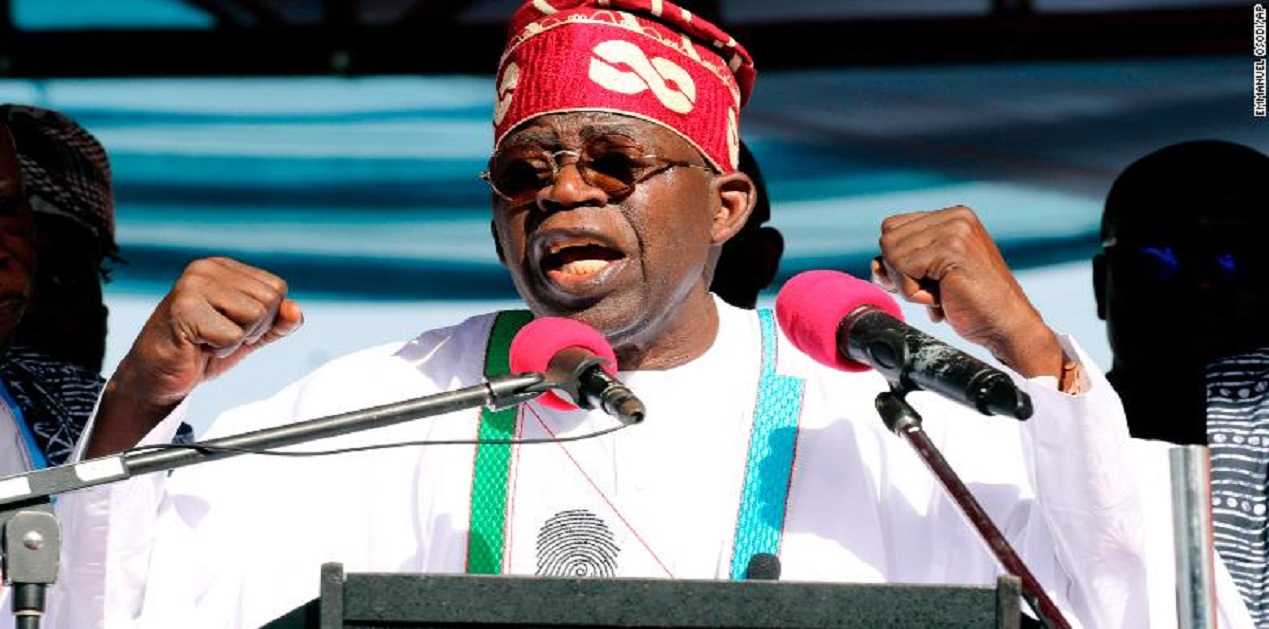As outgoing President Muhammadu Buhari decided to step down after serving the maximum two terms permitted by the constitution, Nigeria held its seventh democratic Presidential electionon 25th February.[1] Since the end of its military dictatorship in 1999, Nigeria has had 24 years of uninterrupted democracy. More than 93 million voters were registered to select one from the 18 candidates, which included a woman.[2] According to the polls, Bola Tinubu, Atiku Abubakar, and Peter Obi were in a three-way seesaw battle to replace Buhari and become the country's next leader. Despite the long delays and the slow arrival of online results, which angered the voters and opposition parties who alleged massive vote-rigging, the election was rather peaceful. Nonetheless, the current election will be marked as the most fiercely contested election in the history of Nigeria's democracy.
On 1st March, Bola Ahmed Tinubu, the 70-year-old former governor of Lagos state and the ruling All Progressives Congress (APC) candidate, was declared the winner.[3] Tinubu is one of Nigeria's most influential politicians. Tinubu had received 8.8 million votes, roughly 36 percent of the valid votes cast. Atiku Abubakar, the PDP candidate who was his main rival, came in second with 6.9 million votes, missing out on the presidency once more. And despite defeating Tinubu in Lagos, his home state, Labour's Peter Obi finished in a distant third place with 6.1 million votes.[4]

Immediately after the results were announced, the main opposition parties rejected the result accusing it of being heavily manipulated and doctored by the electoral body Independent National Electoral Commission (INEC). Additionally, they demanded the removal of INEC chairman Mahmood Yakubu and a fresh election underthe new INEC chairman.[5] Indeed, the election process was marred by controversy particularly related to the electronic voting system called the Bimodal Voter Accreditation System (Bvas).[6] The opposition accused INEC of breaking a pledge with the ruling party. Several international observers groups, including the European Union (EU), pointed out significant flaws in the electoral process. [7] However, the possibility of another fresh election significantly altering the outcome is slim.
With over 200 million citizens, Nigeria is Africa's most populous nation. Yet, at 29 per centvoter turnout, it was the lowest-attended election in Nigerian history. The 2019 election saw a 35% turnout.[8] People's lack of interest in the electoral process was quite apparent. Perhaps they believed that little would happen or that the political class had failed them. However, this was a surprise to many in the light of the widespread, intense enthusiasm among Nigerians in the run-up to the election.
Bola Tinubu, the Next President of Nigeria
The President-elect, Tinubu, is a Muslim from the southwest's predominately Yoruba region. Earlier, he served two terms as the governor of Nigeria's commercial hub Lagos and is widely credited with reshaping it. Commonly known as "Jagaban" to his supporters, he has been controversial in Nigerian politics.[9] He has frequently been charged with maintaining control over the state's finances, despite leaving office in 2007. He has also been accused of possessing massive assets, poor health, certificate forgery, corruption, acting as a bagman for drug (heroin) traffickers, and money laundering network investigations. In fact, the US authorities sued him in 1992, accusing him of laundering the earnings from heroin trafficking. He eventually settled with the payment of $460,000.[10]
On the other hand, his supporters believe he has been a sharp politician since he was first elected governor in 1999. He is frequently credited with contributing to Lagos becoming one of Africa's largest economies. During his administration, Lagos witnessed an enormous rise in income thanks to significant foreign investment. He also resolved the colossal traffic congestion through several innovative steps, including developing new lanes for fast buses.[11] He is also praised for acting as a mediator and playing an important role in President Buhari's ascent to power. "Emi lo kan", which translates to "it's my turn" in Tinubu's native Yoruba, served as his campaign anthem.[12] And now that he has been chosen to be Nigeria's next president, he must tackle Nigeria's severe economic and security crisis, among others.
Mr Kashim Shettima, the running mate and the Vice President-elect of Tinubu, is the former governor of Borno state and a Muslim.[13] This Muslim-Muslim presidential combination was against the customary tradition, and many expected him to pick a Christian from the North as his running mate. Protests erupted, particularly by the Christians, to appease the North of Nigeria, a Muslim majority and the biggest voting bloc in the nation. Many also demanded the replacement of the current Muslim national chairman with a Christian to bring back some balance.[14] However, Tinubu defended his decision by stating that he chose competence over parochial interests.[15]
The newly elected president assured Nigerians that he would be a just leader while offering a hand of friendship to his rivals. Beyond the president-elect's assurances and promises, the election's aftermath revealed a deeply divided nation. And when he takes office on 29th May as Nigeria's sixth elected leader since its independence, Tinubu will need to address some of the country's pressing problems rapidly.
During the time of Buhari over the past eight years, Nigeria has gone through two severe recessions, massive employment loss for youth, skyrocketing price hikes of daily essentials due to inflation, and last but not least, a collapse in the value of the naira. Besides, armed groups are increasingly active throughout the North, central, and southeast of the nation, and kidnappings for ransom have become more widespread. It makes sense that Tinubu's campaign was centred on two crucial and wide-ranging issues: security and the economy.
Addressing Security Challenges
A violent insurgency that originated in the country's northeast has now spread throughout the country and has become a national problem. Banditry has increased significantly, not in terms of insurgency but rather in general crime like kidnapping. Threats from terrorists and Islamist organisations are still present today in Nigeria's North and centre, as well as from secessionist organisations in the southeast. The nation has been waging a bloody insurgency in Borno state for more than ten years, driven by the extremist Boko Haram group, which wants to impose Islamic Sharia law there. According to UN estimates, the ensuing violence has claimed 35,000 lives. The fighting has forced more than 2 million people to flee their homes.[16]
Revamping the Economy
Despite being the largest economy in Africa and ranked among the top oil producers, Nigeria is in a severe economic crisis. Since the administration of outgoing President Muhammadu Buhari took office in 2015, millions of jobs have been lost, and nearly half of the country's youth are unemployed. The naira, the currency of Nigeria, has lost value while inflation has skyrocketed and oil production has fallen to a 40-year low. Nigeria's current national debt is hovering around 77 trillion naira ($167bn).[17] Eighty percent of Nigeria's government's revenue in the first 11 months of 2022 went towards paying off debt, leaving little money for essential services. Currently, 83.57 percent of Nigeria's bilateral debt, totalling $3.9 billion, belongs to China.[18] Furthermore, a currency reform initiative has prevented many from accessing their money, even for purchasing food. In the absence of any future prospects, many young people have been fleeing the country, a phenomenon dubbed the "Japa syndrome" (Nigerian slang for emigration).[19]

During his campaign, Tinubu made several ambitious commitments, from boosting Nigeria's GDP by 10 per cent to reducing youth unemployment by half within the following four years. [20] He also promised to end the popular fuel subsidy, which cost $10 billion in 2022 and advance private sector engagement through PPPs.[21] In fact, one of his preferred strategies as governor of Lagos State was to hire private sector companies to carry out state projects and then reward their performance by giving them a share of the profit made from those projects. By simultaneously increasing the number of taxes and vigorously enforcing their collection, Tinubu increased Lagos's revenue. However, he also believes that there is scope for fiscal expansionism due to Nigeria's low debt-to-GDP ratio, currently at 45 per cent.[22] Therefore, he aims to continue the central bank's deficit monetisation.
Regional and International Implications
Nigeria has both the largest economy and the largest democracy in Africa. Some states have larger budgets than those of many small African nations. The GDP of Lagos State alone exceeds the national GDP of 45 of the 54 countries in Africa.[23] Nigeria is also a regional hegemon in West Africa. It is a significant player even at the African Union (AU) level. Nigeria is regarded as a democratic role model and in the past, has used its clout to mediate disputes in the African continent. Therefore, the impact of the Nigerian election result will undoubtedly have effects far beyond the nation's borders.
In Nigerian politics, China is very pervasive. Nigeria currently has over 200 Chinese companies. It is China's largest export market and its second-largest trading partner in Africa. On the other hand, China is Nigeria's third-largest export market. China have has funded over $47 billion for 22 large-size infrastructural projects across the country.[24] As of 31st March, 2020, Chinese loans to Nigeria totalled US$3.121 billion, or 11.28% of Nigeria's US$ 27.67 billion in external debt.[25] Using Chinese money, outgoing President Muhammadu Buhari's administration has undertaken several significant infrastructure projects, such as the National Public Security Communications System project, the Abuja Light Rail project, and planned terminal expansions at four major airports.[26]
Most recently, in January 2023, outgoing Nigerian President Muhammadu Buhari inaugurated the Lekki Deep Sea Port, a $1.5 billion deep seaport in Lagos with funding from China.[27] Authorities anticipate that it will boost the struggling economy of the West African country. The Lekki Deep Sea Port, one of the largest in West Africa, will relieve cargo congestion, which costs billions of dollars in annual revenue, as well as generate over 170,000 new jobs.[28]
In fact, opposition leader Abubakar accused the APC of sending employees to China for training in order to slow down election card readers in areas he considers his strongholds. In response to opposition claims that Beijing is using Chinese technology for election-related censorship and surveillance, Buhari and Tinubu both have defended pursuing closer ties with Beijing. In fact, Huawei, a major player in Chinese technology, has a significant presence in the nation.
Since 2019, Huawei has trained 2,000 Nigerian Youths and 1,000 Federal Civil Servants across Ministries, Departments and Agencies (MDAs) and plans to train another 1000 government employees in cybersecurity strategy.[29] Working closely with the Federal Government, Huawei has deployed 27,500 mobile phone towers and up to 10,000 kilometres of fibre optic cable in Nigeria in 2022.[30] It has also signed a contract with Federal Government to install an electronic surveillance system at the country's land borders.[31] So far, the company has invested more than $100 million and spent $700 million on procurement between 2015 and 2020.[32]
And in February, Kaduna, a state in northwest Nigeria, selected China's Ming Xin Mineral Separation Nig Ltd. (MXMS) to build the nation's first lithium-processing plant.[33] It aims to produce batteries for electric vehicles (EVs). Yet, only five months ago, the Nigerian government rejected Tesla's proposal to buy raw lithium from the country. Meanwhile, China Sinoma International Engineering and Nigeria's Dangote Industries Limited (DIL) also signed a contract to construct a cement plant with six million tonnes per year in Itori, Ogun State.[34]
Considering China's significant investment projects in Nigeria, it is likely that the All-Progressives Congress (APC) led by Tinubu had Chinese support. At the same time, despite growing Chinese interest in financing and building infrastructure, the US remains one of Nigeria's important partners. Trade relations between Nigeria and the United States peaked at $8.2 billion in 2022.[35] Nigeria and the US continue cooperating on security issues by selling weapons and counterterrorism operations against the Islamist group Boko Haram. A slowdown in the United States weapons export to Nigeria could pave the way for Nigeria to initiate a security alliance with China.
Conclusion
The electoral map also shows how fractious Nigerian politics are and how critical regional identities remain, with clear ethnic and religious divisions. Even though there are 220 million people in Nigeria, only 93 million could cast ballots. Given that only 29 per cent of eligible voters voted, Tinubu will rule over a large number of people who didn't vote for him. Tinubu will therefore face the challenging task of uniting a nation that has fragmented into regional and religious blocs while also winning over the disenfranchised urban youths and Christian Igbos in the southeast. Additionally, as Tinubu will replace the 80-year-old Fulani President Muhammadu Buhari, he will inherit a struggling economy marked by low oil output, high inflation, and modest growth.
Nigeria would require some radical and unpopular reforms, including raising taxes and removing fuel subsidies. It would not be easy for the President-elect to combat Nigeria's myriad of problems all at once: security, inflation, a cash shortage, debt, and unemployment. And these measures are likely to inflame the resentful electorate further, particularly those who did not vote for the president.
Finally, despite many flaws, Nigeria's election was largely peaceful and moderately well-run, a welcome sight in a region plagued by military coups and authoritarian leaders constantly dismantling democratic guardrails. The recently held election in Nigeria is a breath of fresh air and good news for democracy. The question is whether President-elect Bola Tinubu will be able to deliver on what he has promised to Nigerians and awaken the sleeping giant. And in order to accomplish that, his first task would be to unite all Nigerians, regardless of their ethnicity, political views, or religious beliefs, so that Nigeria can persist in its current course of unification, economic growth, and development.
Endnotes :
[1] Sa'eedHusaini. “Nigeria’s 2023 Election: Democratic Development and Political Fragmentation”. IFFRI. February, 2023. https://www.ifri.org/en/publications/notes-de-lifri/nigerias-2023-election-democratic-development-and-political
[2] AsaduChinedu. “Young voters in Nigeria mobilize in record numbers ahead of presidential election”. PBS. February 22, 2023. https://www.pbs.org/newshour/world/young-voters-in-nigeria-mobilize-in-record-numbers-ahead-of-presidential-election
[3] “Nigeria: APC retains power following president Tinubu’s election”. Credendo. March 10, 2023. https://credendo.com/en/knowledge-hub/nigeria-apc-retains-power-following-president-tinubus-election
[4] “Bola Tinubu wins Nigeria's presidential election against Atiku Abubakar and Peter Obi”. BBC. March 1, 2023. https://www.bbc.com/news/world-africa-64760226
[5] Valentine Benjamin “Protesters in Nigeria demand action over alleged election fraud”. March 1, 2023. https://www.thenationalnews.com/world/africa/2023/03/01/protesters-in-nigeria-demand-action-over-alleged-election-fraud/
[6] Godwin Tsa. “Obi storms presidential election tribunal for BVAS ruling”. The Sun. March 8, 2023. https://sunnewsonline.com/obi-storms-presidential-election-tribunal-for-bvas-ruling/
[7] Cameron Duodu “Questions Hang Over INEC’s Handling Of The Presidential Election Of 25 February 2023 In Nigeria”. Modern Ghana. March 11, 2023. https://www.modernghana.com/news/1217396/questions-hang-over-inecs-handling-of-the-presid.html
[8] Hamza Mohamed, Elizabeth Melimopoulos and Virginia Pietromarchi “Nigeria 2023 election: Bola Tinubu declared winner”. Al Jazeera. March 1, 2023. https://www.aljazeera.com/news/liveblog/2023/3/1/nigeria-election-results-live-tinubu-declared-winner
[9]“Who is Bola Tinubu, Nigeria’s president-elect?”. Al Jazeera. March 1, 2023. https://www.aljazeera.com/news/2023/3/1/who-is-nigerias-new-president-elect-bola-tinubu
[10] Emmanuel Akinwotu “Nigeria, Africa's most populous nation, elects Bola Tinubu as the new president”. NPR. February 28, 2023. https://www.npr.org/2023/02/28/1160204284/nigeria-africas-most-populous-nation-elects-bola-tinubu-as-the-new-president
[11] “Three Decades with Tinubu: My story”. Vanguard. July 31, 2022. https://www.vanguardngr.com/2022/07/three-decades-with-tinubu-my-story/
[12] OkeriNgutjinazo. “Who is Nigeria's president-elect Bola Tinubu?”.DW. March 1, 2023. https://www.dw.com/en/who-is-nigerias-president-elect-bola-tinubu/a-64851330
[13] SeunOpejobi, “Presidential election: How Nigerians defied ethnic lines”. Daily Post. https://dailypost.ng/2023/03/08/presidential-election-how-nigerians-defied-ethnic-lines/
[14] “APC Should Replace National Chairman, Adamu With Christian Over Tinubu’s Muslim-Muslim Presidency – NWC Member”. Sahara Reporters. March 10, 2023. https://saharareporters.com/2023/03/10/apc-should-replace-national-chairman-adamu-christian-over-tinubus-muslim-muslim
[15] NdahiMarama. “I’ll run govt of accountability, Tinubu tells Borno APC supporters”. Vanguard. February 18, 2023. https://www.vanguardngr.com/2023/02/ill-run-govt-of-accountability-tinubu-tells-massive-apc-supporters-in-borno/
[16] “Boko Haram survivors meet Pope on Women's Day”. Africa News. March 8, 2023. https://www.africanews.com/2023/03/08/boko-haram-survivors-meet-pope-on-womens-day//#:~:text=Italy,after%20enduring%20years%20of%20violence.
[17] “Nigeria's Total Public Debt Stock as at September 30, 2022”. Debt Management Office Nigeria. September 30, 2022. https://dmo.gov.ng/news-and-events/dmo-in-the-news/press-release-nigeria-s-total-public-debt-stock-as-at-september-30-2022
[18] “China accounts for 66% debt-service payments by Nigeria, other IDA countries in 2022”. Premium Times Nigeria. December 8, 2022. https://www.premiumtimesng.com/news/top-news/569564-china-accounts-for-66-debt-service-payments-by-nigeria-other-ida-countries-in-2022-world-bank.html
[19] OgungbileOludotun “Nigerians and the japa syndrome”. Punch. February 7, 2023. https://punchng.com/nigerians-and-the-japa-syndrome/
[20] Max Siollun “Bola Tinubu’s Pyrrhic Victory”. Foreign Policy. March 8, 2023. https://foreignpolicy.com/2023/03/08/nigeria-election-apc-bola-tinubu-pyrrhic-victory/
[21] Macdonald Dzirutwe. “Nigeria election: what to expect from president-elect Bola Tinubu”. Reuters. March 1, 2023. https://www.reuters.com/world/africa/nigeria-election-what-expect-president-elect-bola-tinubu-2023-03-01/
[22] DulueMbachu “Buhari leaves stricken economy for his successor”. African Business. February 17, 2023. https://african.business/2023/02/politics/buhari-leaves-stricken-economy-for-his-successor/
[23] TonyeBakare. “Data shows Lagos is not Africa’s third-biggest economy, as claimed by officials of Nigerian ruling party”. AFP Factcheck. August 30, 2022. https://factcheck.afp.com/doc.afp.com.32HB7KG
[24] KingsleyJeremiah “Stakeholders demand terms for $47b Chinese loan, projects execution. The Guardian. March 3, 2020. https://guardian.ng/news/stakeholders-demand-terms-for-47b-chinese-loan-projects-execution/
[25] Emma Ujah. “DMO explains $3.121bn Chinese loans”. Vanguard. Vanguard. June 19, 2020.
https://www.vanguardngr.com/2020/06/dmo-explains-3-121bn-chinese-loans/
[26] Robert Bociaga “China looms large over Nigeria's presidential election”. Nikkei Asia. February 21, 2023. https://asia.nikkei.com/Politics/International-relations/China-looms-large-over-Nigeria-s-presidential-election
[27] AsaduChinedu. “Nigeria bets on Chinese-funded port to drive economic growth”. AP News. January 24, 2023. https://apnews.com/article/nigeria-government-china-muhammadu-buhari-lagos-b925ec9a4569da06d7e73a90993f64e0
[28] Yusuf Babalola. “$1.5bn Lekki Deep Seaport To Enhance Nigeria’s Export Competitiveness”. Leadership. https://leadership.ng/1-5bn-lekki-deep-seaport-to-enhance-nigerias-export-competitiveness/
[29] Ajiri Daniels “FG, HUAWEI sign MOU to train 1,000 civil servants in 2nd phase ICT for change programme” The Sun. March 7, 2022.https://sunnewsonline.com/fg-huawei-sign-mou-to-train-1000-civil-servants-in-2nd-phase-ict-for-change-programme/
[30] Ouz. “Huawei has installed 27500 communication sites in Nigeria”. Gizmo China. November 29, 2022. https://www.gizmochina.com/2022/11/29/huawei-installed-27500-communication-sites-in-nigeria/
[31] “FG engages Huawei for electronic surveillance of land borders”. Ships and Ports. October 10, 2022. https://shipsandports.com.ng/fg-engages-huawei-for-electronic-surveillance-of-land-borders/
[32] TemitayoJaiyeola “Huawei spends $700m on procurement in Nigeria”. Punch. April 9, 2022. https://punchng.com/huawei-spends-700m-on-procurement-in-nigeria/
[33] “China beats Tesla to Nigeria’s lithium riches”. The Mint Magazine. February 24, 2023. https://www.themintmagazine.com/china-beats-tesla-to-nigerias-lithium-riches/
[34] “Dangote, Sinoma sign agreement on new cement plant in Ogun”. Premium Times. February 1, 2023. https://www.premiumtimesng.com/news/more-news/579346-dangote-sinoma-sign-agreement-on-new-cement-plant-in-ogun.html
[35] Victoria Ojeme. “Nigeria-US trade relations peak at $8.2bn in 2022”. Vanguard. March 3, 2023. https://www.vanguardngr.com/2023/03/nigeria-us-trade-relations-peak-at-8-2bn-in-2022/
(The paper is the author’s individual scholastic articulation. The author certifies that the article/paper is original in content, unpublished and it has not been submitted for publication/web upload elsewhere, and that the facts and figures quoted are duly referenced, as needed, and are believed to be correct). (The paper does not necessarily represent the organisational stance... More >>
Image Source: https://cdn.cnn.com/cnnnext/dam/assets/230228211900-bola-ahmed-tinubu-221115-exlarge-169.jpg











Post new comment